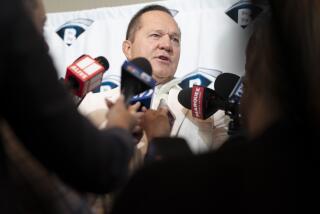Baseball Owners Open Door to Talks : Contract: With lockout looming, they vote, 15-13, to resume player negotiations.
- Share via
LOUISVILLE, Ky. — It didn’t seem to be a mandate, but by a 15-13 vote Monday, major league baseball owners approved reopening collective bargaining with the players’ union.
They also voted unanimously to amend the bylaws of their Player Relations Council to require three-fourths support for a work stoppage, rather than a simple majority.
“We are not seeking confrontation,” Richard Ravitch, president of the PRC, said after the owners’ four-hour meeting. “Not a single owner advocated lockout, and no decision was made on a lockout at this time.”
But Don Fehr, executive director of the players’ union, asked about the possibility of a stoppage in next season, said: “History is not with us. We have to hope history will be wrong this time.”
All seven labor negotiations between the owners and union have produced work stoppages. There have been three strikes and four lockouts.
Determined to change the compensation system, the owners did not set a date by which a new agreement has to be in place to avoid a lockout, Ravitch said.
“I do not believe that work stoppages produce better results than collective bargaining talks,” he said. “We will move for change rationally, quietly and constructively.”
Ravitch would not reveal details of the plan he intends to present to the union, but parts of it might be in a report by the joint economic study committee created during the last negotiations.
That report, which Fehr declined to discuss because, he said, only parts of it have been leaked to the media, says the eligibility requirement for free agency should be reduced from six years to three years and arbitration eliminated. It recommends revenue sharing among the owners and a partnership with the players.
Fehr cited a series of tumultuous events in baseball, from the Seattle ownership question to the scrubbed plan to realign, to the forced resignation of Commissioner Fay Vincent to the debate over the move of the San Francisco Giants to Florida to the Marge Schott controversy and said:
“The last 18 months have produced unusual turmoil, bickering and meanness--all on their side. For all of their talk of partnership, they didn’t once solicit our view on any of that. As I’ve said before, if it’s a parternship, we have to have a voice in major decisions affecting revenue and other aspects of the game’s operation. The players have more and more questions with the owners’ ability to run the game well.”
The current four-year agreement technically expires after the 1994 season, but a covenant provided both sides with the opportunity to reopen a year early. The deadline was Friday.
Ravitch said the reopening of talks was approved because of a desire to affect changes for the 1994 season, which would have been impossible otherwise. The only items that can be discussed under terms of the reopening concern salary and the free agency system.
The Monday vote was by secret ballot, but the Angels and Dodgers are known to have supported it. The threat that some of the $401 million at stake in the last year of the national TV contract could be lost by a 1993 work stoppage caused many clubs to oppose it.
It is also believed that the threat of a stoppage concerned a coalition of new owners from Seattle, Houston, Detroit and the two expansion cities--Denver and Miami.
Of the close vote, Ravitch said he encouraged an intense and honest debate and added that many clubs were obviously concerned about the stoppage risk but also “reassured that no one was talking or thinking in that direction.
“Of course,” he added, with a smile, “I wasn’t surprised (by the close vote). How often does this group do anything unanimously?”
Ravitch, 59, was hired through an executive search a year ago. He is a Phi Beta Kappa graduate of Columbia and received a law degree from Yale. He has been credited with restoring financial credibility to New York’s Metropolitan Transit Authority and Urban Development Corporation during a career in public service, politics, construction, business development and labor negotiations.
“I have been characterized as a union buster, but I did not hire on to wage war with the union,” he said, insisting that he believes in communication and negotiation, having seen the impact of a work stoppage while involved in an 11-day subway strike that “left millions unemployed.”
“Everyone says that what we need in baseball is an effective partnership with the players, and I agree,” Ravitch said. “But I have urged the owners to first resolve revenue sharing among themselves so the two partnerships can work more effectively.”
He noted the new wave of big-money signings and said that “all the available cash is going to player compensation.”
Fehr disagreed, saying that the owners talk about their revenue losses while pursuing high-salaried free agents. He added that the union has expected a reopening of talks for more than a year, and it is known to have prepared for a possible lockout by withholding the players’ licensing revenue.
He said he views Ravitch as allied with the “hard-line owners” and could not predict when negotiations would start.
“The notion of a reopener in which the players just sit there and react to whatever comes across the table is ludicrous,” Fehr said. “We have to step back now and think about the type of changes we may want to propose.”
More to Read
Go beyond the scoreboard
Get the latest on L.A.'s teams in the daily Sports Report newsletter.
You may occasionally receive promotional content from the Los Angeles Times.










